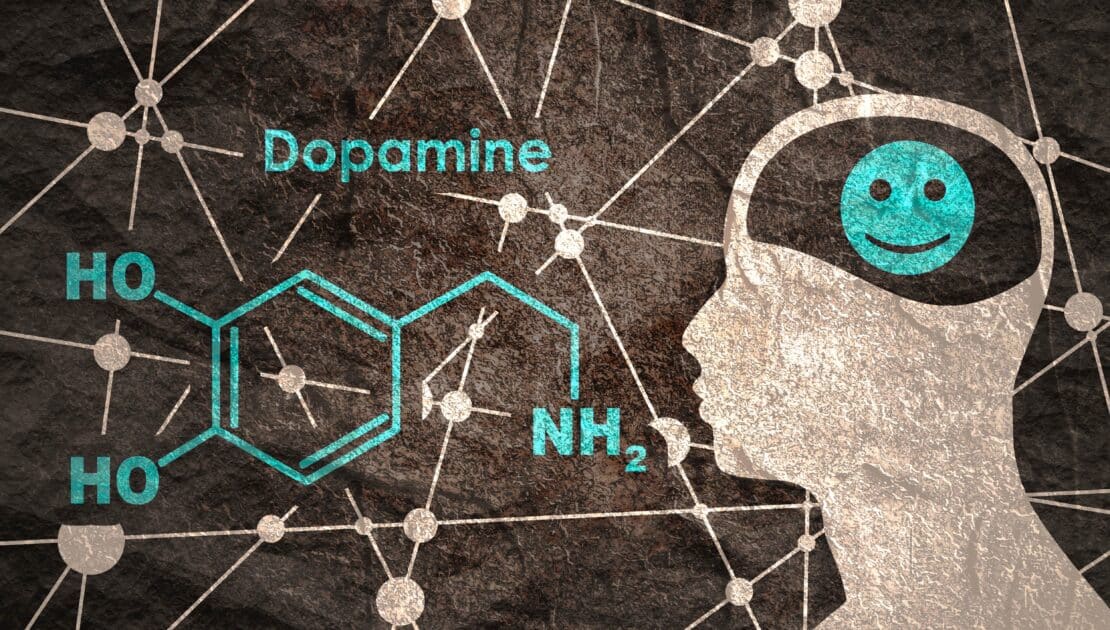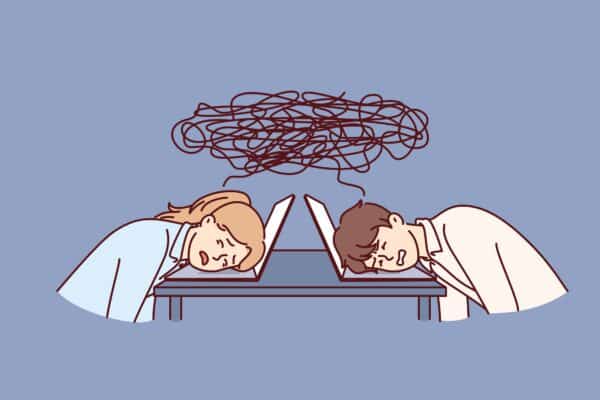Are You Chasing Dopamine? 5 Brain Hacks to Reset Your Motivation Center
Dopamine is a powerful neurotransmitter, but did you know that it’s involved in the brain’s reward and motivation circuitry? What is Dopamine? Dopamine is a chemical messenger that helps send signals between nerve cells. It’s one of the four primary neurotransmitters in the brain. It’s involved in the brain’s reward circuitry and plays a vital…

Dopamine is a powerful neurotransmitter, but did you know that it’s involved in the brain’s reward and motivation circuitry?
What is Dopamine?
Dopamine is a chemical messenger that helps send signals between nerve cells. It’s one of the four primary neurotransmitters in the brain. It’s involved in the brain’s reward circuitry and plays a vital role in motivation, behavior, and cognition.
When you experience something pleasurable, your brain releases dopamine in the brain. It’s responsible for transmitting signals between nerve cells that encourage you to do more of whatever it was that made us feel good.
Dopamine plays a critical role in learning and motivation. It’s also linked with other essential functions such as mood regulation, movement control, and attention span.
Dopamine Plays a Role in Your Natural Reward System

Here’s a situation you may find familiar:
You’re out to dinner with friends, chatting over the menu options, when you spy their famous death-by-chocolate cake. You’re still deciding what entree to order, so you sigh and make your choice. Maybe you can get the cake for dessert, you think, closing the menu.
But all through dinner, you notice that your thoughts keep wandering back to that cake. By the time your party is finished with the meal, your mouth is watering, and you’re craving cake.
Right on time, the waiter brings out the dessert menu. You’re ready to place your order.
After an eternity, your waiter places the infamous death-by-chocolate cake on the table. Picking up your fork, you dig in. From the first bite, it’s delicious — chef’s kiss.
So what does eating cake have to do with dopamine? The dopamine released by your brain is a part of every action that ensures that chocolate cake arrives in front of you pacesetting when it’s time for dessert.
The more dopamine you get from an activity – in this case, eating chocolate cake — your brain will likely want to repeat that activity. That means more chocolate cake for you in the future! Dopamine doesn’t just give you that feeling of pleasure once you start eating the cake.
The entire process, from cake daydreams to final bite, is full of dopamine surges because dopamine is responsible for actions that lead to a reward — not just the reward itself.
What Happens When Your Dopamine Isn’t Balanced?
Dopamine plays an important role in the healthy human brain. It controls our pleasure centers, so when dopamine levels rise, they light up.
If you have too much dopamine at one time or for too long — it can become toxic to the body and mind. A dopamine-overloaded brain begins to behave like the brain of a substance abuser, repeatedly seeking out the following “high” from a new experience.
Dr. Anna Lembke, author of Dopamine Nation: Finding Balance in the Age of Indulgence, claims that this pain-pleasure cycle benefited our ancestors. Early man constantly hunted for shelter, food, and, most importantly, water.
Early man’s survival depended upon their desire to find the next meal. And dopamine was the critical neurotransmitter that motivated them to seek the next “pleasure” of rest, food, or drink.

In today’s world, the constant input from screens, technology, sugar, drugs, sex, and social media — there’s a virtual flood of information with the potential to light up your brain like a Christmas tree 24 hours a day, seven days a week.
And your brain isn’t wired to respond well to that much stimulation long-term. Repeated exposure to these dopamine enhancers creates an imbalance that causes depression and anxiety.
In modern life, we have many ways to get our dopamine fix. But to live a truly satisfying life, we need to find healthy ways to regulate the dopamine levels in our brains.
The Dark Side of Dopamine

Your brain is wired to seek pleasure. Repeated exposure to your favorite stimuli and the resulting dopamine release in your brain will eventually change how your brain processes information.
This change in processing leads to cravings for the stimulus. When you indulge too much in something, it has the potential to become addictive.
Symptoms of a body overloaded with dopamine include:
➔ Anxiety
➔ Depression
➔ Craving for more dopamine-boosting activities
➔ Irritability
Once you’re in a dopamine addiction spiral — you’re willing to do whatever it takes for that dopamine fix. And it’s more likely you’ll associate happiness with that activity.
And you’ll repeat that behavior over and over without realizing what’s happening until your life is unmanageable. But there’s good news — the symptoms of dopamine dependency are reversible.
Your brain is a powerful control system capable of learning new habits. You can help by creating wholesome, healthy habits enabling your brain to reset.
Strict Dopamine Fasting Gives Inconsistent Results
Dopamine fasting is a current buzzword that has led to a misconception: denying yourself all enjoyable experiences to “reset” your brain won’t lower the threshold at which you experience pleasure.
While it might work short term, as self-denial of any kind gives you a brief “high,” it doesn’t increase your overall long-term happiness.
It’s much healthier to adopt some practices to reset your dopamine baseline. If you’re like most humans, you’ll see a reduction in brain fog symptoms, mindless late-night phone scrolling, anxiety, and even depression by making a few changes to your daily routine and mindset.
Resetting Your Dopamine Baseline
It’s important to allow dopamine levels to return to baseline rather than to rise upwards, creating tolerance. Any steps you take to reduce the amount of input your brain receives is a step in the right direction.
Don’t worry—you can still enjoy your screens (and chocolate cake) during this time. Cutting out all your favorite things forever isn’t what we’re suggesting. The key is moderation.
It’s more about getting your “pleasure-pain balance” back in check and learning how to manage it better. This ensures you feel more balanced and happy throughout your life instead of riding the roller coaster of highs and lows of dopamine spikes.
5 Habits That Will Help Reset Your Dopamine Baseline
● Healthy routines develop into good habits.
Humans are creatures of habit. A plan that includes a framework for your day reminds you to be intentional with your time. Make sure this plan includes time spent participating in real-life activities away from your screen.
Find an activity to replace mindless scrolling and have it ready just in case you’re tempted to pick up your phone without thinking.
Love to draw? Keep your sketchbook nearby with a pencil. ✏️
Miss the smell of real books? Head to your local library and introduce yourself. Check out a book that inspires positive change in your life.
● Exercise regularly, preferably every day.
Getting outside and moving your body doesn’t require a strenuous exercise routine.
Try an easy stretching routine, check out the local yoga studio, or lace up your shoes and go for a walk. The fresh air will help boost your mood naturally.
● Eat healthy foods in moderation, reduce sugar, and drink plenty of water throughout the day.
An average of 60-70% of your total body mass is water. Staying hydrated is critical for your body to work correctly — especially when working on healthy habits.
Improving your diet will do more than leveling out your dopamine. Include healthy fats to nourish your brain and fresh produce to give your body essential nutrients.
● Get enough sleep.
Most adults need at least 7-8 hours of shuteye per night, but adjust this number based on how much sleep you need to feel well-rested and energized during the day!
Serenity’s Bedtime Blend Tincture encourages restful sleep. It is designed to provide your body with the aid it needs to consistently get a good night’s rest.
Made with natural, full-spectrum hemp oil and an array of calming botanicals, it helps you wind down and drift off to sleep.
● Begin meditating.
Even if meditation isn’t something you’re in the habit of doing, try taking just a few minutes to practice intentional breathing each morning or evening before bedtime.
Studies show meditation helps improve focus, reduce stress levels, and increase focus throughout your day.
Suppose you learn how to reset your dopamine receptors by allowing them a chance to recharge?
You can start producing healthy habits that set you up for success for years to come starting as soon as today.

The Choices Are Yours to Make.
Neuroplasticity is powerful…if we can find a way to direct it. Taking control of the reward centers in your brain means that you dictate where you focus your energy, what actions you take or don’t take, and how you perceive regular daily experiences.
A healthy, balanced lifestyle includes time to unwind and take time for yourself. By integrating healthy routines that develop into good habits, you can rewire your brain for long-term health benefits.
The next time you feel the urge to crank something out, take a step back. Get more sleep and read something insightful. Meditate. Take a walk. Do something that doesn’t involve staring at a screen.
Doing so will help you avoid burnout in the long term and enable you to produce better work in the short term. Remember, Serenity loves you. All of you. Regardless.


